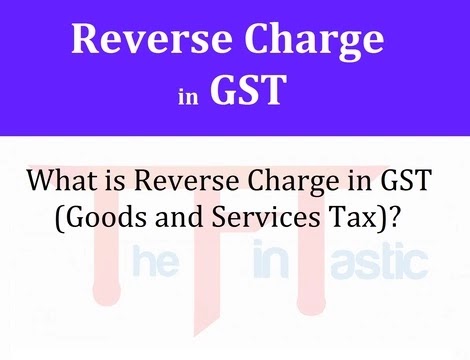Reverse charge is where the recipient of the goods, as well as services are obligated to pay GST rather than the supplier.
What is Reverse Charge?
Regularly, the supplier of goods or services pays the tax on supply. On account of Reverse Charge, the receiver gets at risk to pay the tax, i.e., the chargeability gets reversed.
When is Reverse Charge Applicable?
Supply from an Unregistered dealer to a Registered dealer
On the off chance that a vendor who isn't registered under GST, supplies goods to an individual who is registered under GST, at that point Reverse Charge would apply. This implies that the GST should be paid straightforwardly by the receiver to the Government rather than the supplier.
The registered dealer who needs to pay GST under reverse charge needs to do self-invoicing for the purchases made.
For Inter-state purchases, the purchaser needs to pay IGST. For Intra-state bought CGST and SGST must be paid under RCM by the buyer.
(Also Read: GST identification number)
Services through a web-based business operator
If an online business operator supplies services, at that point, reverse charge will be pertinent to the internet business operator. He will be at risk to pay GST.
For instance, UrbanClap offers types assistance of plumbers, electricians, teachers, beauticians, and so forth UrbanClap is at risk to pay GST and collect it from the customers rather than the registered specialist organizations.
If the online business operator doesn't have a physical presence in the taxable territory, at that point an individual speaking to such an electronic commerce operator for any reason will be at risk to pay tax. If there is no agent, the operator will choose a delegate who will be held subject to pay GST.
Supply of specific goods and services determined by CBEC
CBEC has given the elite of goods and a rundown of services on which reverse charge is appropriate.
(Also Read: GST refund procedure)
Season of Supply under Reverse Charge
Season Of Supply in case of Goods
In case of reverse charge, the hour of supply will be the most punctual of the accompanying dates:
- the date of receipt of goods
- the date of payment*
- the date following 30 days from the date of issue of an invoice by the supplier
On the off chance that it is absurd to expect to decide the hour of supply, the hour of supply will be the date of passage in the books of account of the recipient.
*This point is not any more appropriate based this Notification No. 66/2017 – Central Tax gave on 15-11-2017.
- Date of receipt of goods 15th May 2018
- Date of invoice 1st June 2018
- Date of passage in books of receiver 18th May 2018
The Time of supply of administration, in this case, will be 15th May 2018.
Season Of Supply in case of Services
In case of reverse charge, the hour of supply will be the most punctual of the accompanying dates:
- The date of payment
- The date following 60 days from the date of issue of invoice by the supplier
On the off chance that it is beyond the realm of imagination to expect to decide the hour of supply, the hour of supply will be the date of passage in the books of account of the recipient.
- Date of payment 15th July 2018
- The date following 60 days from the date of issue of the invoice (Suppose the date of the invoice is 15th May 2018, at that point 60 days from this date will be 14th July 2018)
- Date of passage in books of receiver 18th July 2018
The Time of supply of administration, in this case, will be 14th July 2018.
What is Self Invoicing?
Self-invoicing is to be done when you have bought from an unregistered supplier AND such acquisition of goods or services falls under reverse charge.
This is because of the way that your supplier can't give a GST-consistent invoice to you, and accordingly, you become subject to pay taxes for their benefit. Subsequently, self-invoicing, in this case, gets fundamental.
FAQ
Is Input Tax Credit permitted under Reverse Charge?
Tax paid on reverse charge premise will be accessible for an input tax credit if such goods as well as services are utilized, or will be utilized, for business. The recipient (i.e., who pays reverse tax) can profit input tax credit.
(Also Read: GST Cess)



No comments:
We welcome encouraging, respectful and relevant comments. Thank You!!